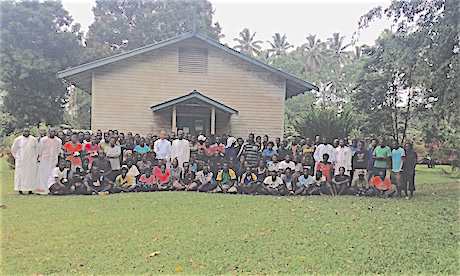The Diocese of Bougainville has been running Sunday School awareness workshops in parishes this month.
The purpose of workshops was to get a consensus from the people.
Around 3,500 people from 20 parishes have participated in the workshops.
By the end of October the parishes will make a decision about whether they want the Sunday School.
The workshops have been conducted by the Bishop of Bougainville Bernard Unabali, Father Shanthi Chacko Puthussery, the secretary of Commission for Youth and Laity in the Catholic Bishops Conference of Papua New Guinea and Solomon Islands and and Peter Salei, the Diocesan Catholic Religious Education Coordinator.
The Bishop explained his overall pastoral plan for the Diocese.
Peter explained the current situation of the religious education in the primary and secondary schools. He provided examples to show the inadequacy of what is currently being done.
Father Shanthi explained what Sunday School is and how it functions.
He showed the participants the textbooks from Grade One to Grade Twelve that the Sunday School would use.
Fr Shanthi who is a member of the Pontifical Institute for Foreign Missions (PIME) comes from Kerala in India.
A Sunday school programme has been running in India since 1928. It has a syllabus, text books, half-yearly and yearly examinations in every grade, scholarship examinations, training for the teachers and several other activities.
From 1970 t0 1981 Fr Shanthi attended Sunday School regularly in his home parish. From 1983 to 1987 he was a Sunday School teacher.
Shanthi wanted to have similar Sunday School program at Alotau Diocese while he was there from 2000 to 2006 but somehow, in spite of his best efforts nothing much came of it.
The commonly expressed opinion at almost all the awareness workshops was that the Sunday School is the right pastoral answer.
Many of the participants were of the opinion that religious education in the primary, high/secondary school is not very effective.
They were concerned that many teachers in the schools are not interested in teaching Religious Education.
The participants strongly felt that it would be better to have a regular proper alternative faith formation structure for the Catholic children and young people by the diocese.
It was thought however that voluntary Church workers might expect to receive some sort of payment. This may create further confusion.
Source
- Supplied
